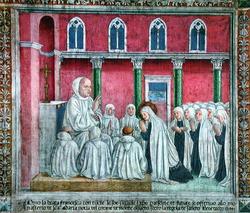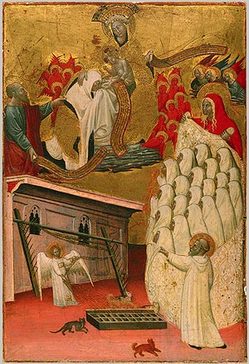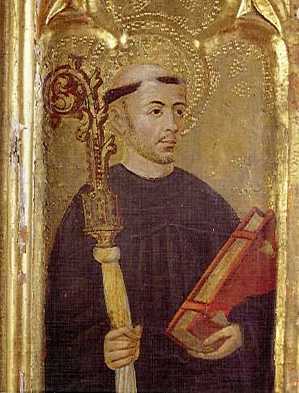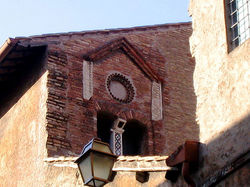This is a rather important talk Pope Benedict XVI gave while visiting the Oblates of Saint Frances of Rome. Every pope since the 16th century has visited this monastery. Pope John Paul was the last 25 years ago.
Dear Oblate Sisters,
 After my visit to the nearby Municipal Hall on the Capitoline Hill, I come with great joy to meet you at this historic Monastery of Santa Francesca Romana, while you are still celebrating the fourth centenary of her canonization on 29 May 1608. Moreover, the Feast of this great Saint occurs this very day, commemorating the date of her birth in Heaven. I am therefore particularly grateful to the Lord to be able to pay this tribute to the "most Roman of women Saints", in felicitous continuity with the meeting I have just had with the Administrators at the municipal headquarters. As I address my cordial greeting to your community, and in particular to the President, Mother Maria Camilla Rea whom I thank for her courteous words expressing your common sentiments I also extend my greeting to Auxiliary Bishop Ernesto Mandara, to the students who live here and to everyone present.
After my visit to the nearby Municipal Hall on the Capitoline Hill, I come with great joy to meet you at this historic Monastery of Santa Francesca Romana, while you are still celebrating the fourth centenary of her canonization on 29 May 1608. Moreover, the Feast of this great Saint occurs this very day, commemorating the date of her birth in Heaven. I am therefore particularly grateful to the Lord to be able to pay this tribute to the "most Roman of women Saints", in felicitous continuity with the meeting I have just had with the Administrators at the municipal headquarters. As I address my cordial greeting to your community, and in particular to the President, Mother Maria Camilla Rea whom I thank for her courteous words expressing your common sentiments I also extend my greeting to Auxiliary Bishop Ernesto Mandara, to the students who live here and to everyone present.
As you know, together with my collaborators in the Roman Curia, I have just completed the Spiritual Exercises which coincided with the first week of Lent. In these days I have experienced once again how indispensable silence and prayer are. And I also thought of St Frances of Rome, of her unreserved dedication to God and neighbour which gave rise to the experience of community life here, at Tor de' Specchi. Contemplation and action, prayer and charitable service, the monastic ideal and social involvement: all this has found here a "laboratory" rich in fruits, in close connection with the Olivetan nuns of Santa Maria Nova. But the real impetus behind all that was achieved in the course of time was the heart of Frances, into which the Holy Spirit had poured out his spiritual gifts and at the same time inspired a multitude of good initiatives.
Your monastery is located in the heart of the city. How is it possible not to see in this, as it were, the symbol of the need to bring the spiritual dimension back to the centre of civil coexistence, to give full meaning to the many activities of the human being? Precisely in this perspective your community, together with all other communities of contemplative life, is called to be a sort of spiritual "lung" of society, so that all that is to be done, all that happens in a city, does not lack a spiritual "breath", the reference to God and his saving plan. This is the service that is carried out in particular by monasteries, places of silence and meditation on the divine word, places where there is constant concern to keep the earth open to Heaven. Then your monastery has its own special feature which naturally reflects the charism of St Frances of Rome. Here you keep a unique balance between religious life and secular life, between life in the world and outside the world. This model did not come into being on paper but in the practical experience of a young woman of Rome; it was written one might say by God himself in the extraordinary life of Francesca, in her history as a child, an adolescent, a very young wife and mother, a mature woman conquered by Jesus Christ, as St Paul would say. Not without reason are the walls of these premises decorated with scenes from her life, to show that the true building which God likes to build is the life of Saints.
 In our day too, Rome needs women and of course also men but here I wish to emphasize the feminine dimension women, as I was saying, who belong wholly to God and wholly to their neighbour; women who are capable of recollection and of generous and discreet service; women who know how to obey their Pastors but also how to support them and encourage them with their suggestions, developed in conversation with Christ and in first-hand experience in the area of charity, assistance to the sick, to the marginalized, to minors in difficulty. This is the gift of a motherhood that is one with religious self-gift, after the model of Mary Most Holy. Let us think of the mystery of the Visitation. Immediately after conceiving the Word of God in her heart and in her flesh, Mary set out to go and help her elderly kinswoman Elizabeth. Mary's heart is the cloister where the Word continues to speak in silence, and at the same time it is the crucible of a charity that is conducive to courageous gestures, as well as to a persevering and hidden sharing.
In our day too, Rome needs women and of course also men but here I wish to emphasize the feminine dimension women, as I was saying, who belong wholly to God and wholly to their neighbour; women who are capable of recollection and of generous and discreet service; women who know how to obey their Pastors but also how to support them and encourage them with their suggestions, developed in conversation with Christ and in first-hand experience in the area of charity, assistance to the sick, to the marginalized, to minors in difficulty. This is the gift of a motherhood that is one with religious self-gift, after the model of Mary Most Holy. Let us think of the mystery of the Visitation. Immediately after conceiving the Word of God in her heart and in her flesh, Mary set out to go and help her elderly kinswoman Elizabeth. Mary's heart is the cloister where the Word continues to speak in silence, and at the same time it is the crucible of a charity that is conducive to courageous gestures, as well as to a persevering and hidden sharing.
Dear Sisters, thank you for the prayers with which you always accompany the ministry of the Successor of Peter and thank you for your invaluable presence in the heart of Rome. I hope that you will experience every day the joy of preferring nothing to love of Christ, a motto we have inherited from St Benedict but which clearly mirrors the spirituality of the Apostle Paul, venerated by you as Patron of your Congregation. To you, to the Olivetan monks and to everyone present here, I warmly impart a special Apostolic Blessing.
 The July feast was the one celebrated in
The July feast was the one celebrated in 







